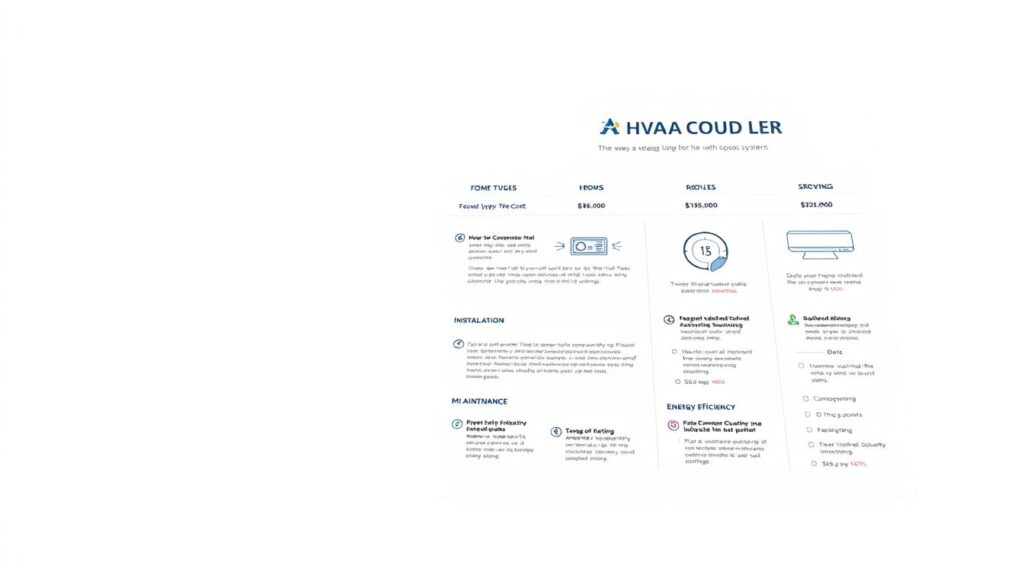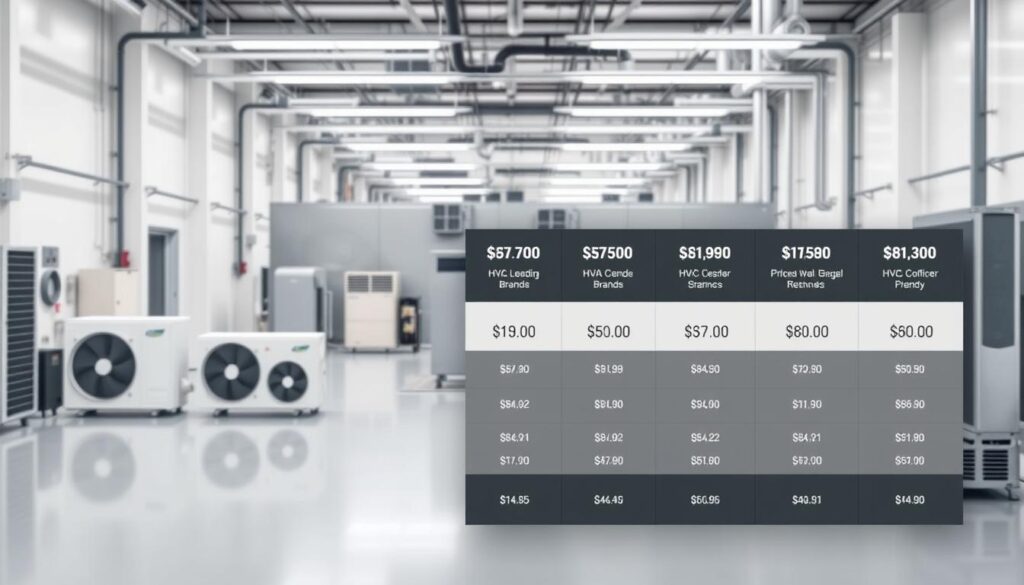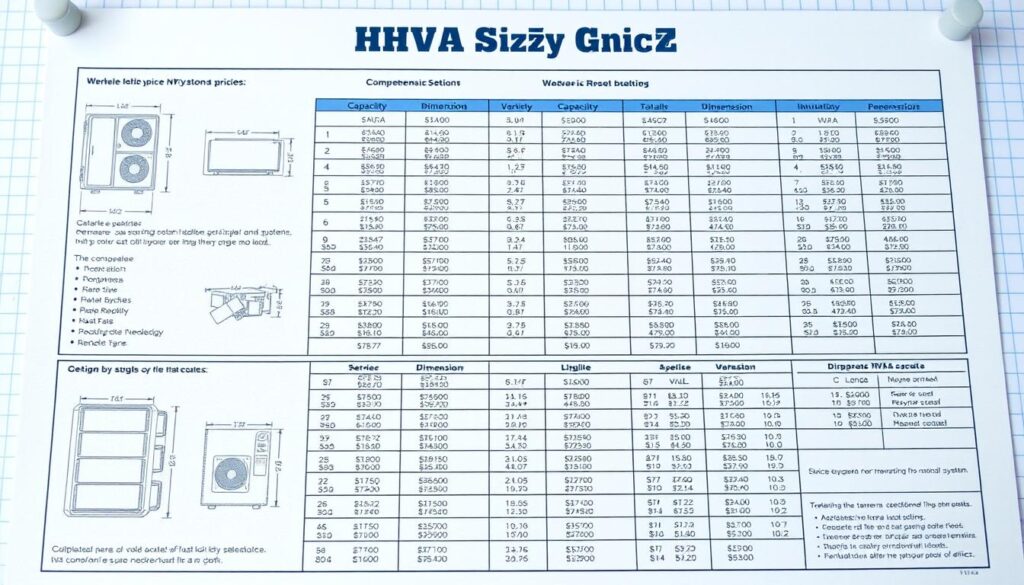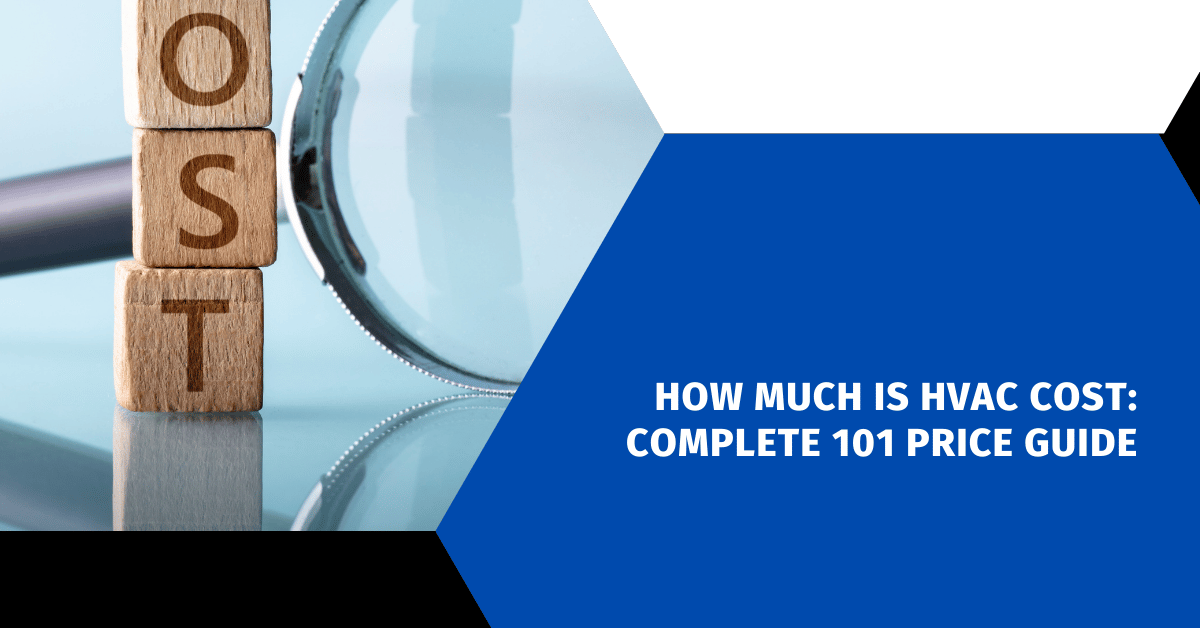Affiliate Disclosure
HVAC Guide Guys is a participant in the Amazon Services LLC Associates Program, an affiliate advertising program designed to provide a means for sites to earn advertising fees by advertising and linking to Amazon.
How Much Is HVAC Cost? Ever felt like figuring out HVAC costs is like solving a puzzle? It’s tough for homeowners to understand, with prices changing a lot. This can range from small repairs to replacing the whole system.

Your home’s comfort relies on a good HVAC system. The prices for these systems are complex. Many factors can affect your budget and the value of your investment.
This guide aims to clear up the confusion around HVAC costs. We’ll help you understand the financial side of keeping your home’s temperature just right. You’ll learn about installation costs and how to avoid expensive repairs. We’re here to give you the information you need to make smart choices.
Key Takeaways
- HVAC costs vary widely based on system type and home size
- Installation prices range from $3,800 to $7,500 for complete systems
- Regular maintenance can prevent expensive emergency repairs
- Energy-efficient systems offer long-term cost savings
- Regional differences significantly impact overall HVAC expenses
Table of Contents
Understanding HVAC System Basics
When looking at hvac unit prices and costs, knowing the basics is key. Your home’s comfort depends on picking the right system. It should meet your needs and fit your budget.
Modern HVAC systems are complex. They control indoor temperature, humidity, and air quality. Each system has its own benefits and challenges for homeowners.
Common Types of HVAC Systems
- Central Air Conditioning: Best for whole-home cooling
- Heat Pump Systems: Efficient heating and cooling solution
- Ductless Mini-Split Systems: Flexible zone-based temperature control
- Geothermal Systems: Environmentally friendly option
Essential HVAC Components
Knowing the core components helps you make smart choices about hvac equipment costs:
- Condenser Unit: External component that releases heat
- Evaporator Coil: Absorbs indoor heat
- Compressor: Circulates refrigerant
- Ductwork: Distributes conditioned air
HVAC System Configurations
Different homes need specific HVAC setups. Size, insulation, and climate play big roles. They affect what system you choose and its price.
Choosing the right HVAC system is an investment in your home’s comfort and energy efficiency.
Explore Our HVAC Shop
Looking for top-rated HVAC tools, parts, and accessories? Visit our shop and find the perfect solution for your needs.
Visit the ShopHow Much Is HVAC Cost
Understanding HVAC pricing can be tricky. But knowing the current rates helps you make smart choices. In 2024, HVAC costs are changing with new tech and market shifts.
The cost of HVAC systems varies based on several factors. For homes, HVAC costs range from $5,000 to $12,000 for full setups. Here’s a breakdown of costs for different systems:
- Central Air Conditioning: $3,800 – $7,500
- Heat Pumps: $4,200 – $8,000
- Furnace Systems: $2,500 – $6,300
Your final cost depends on several things. These include:
- Home size
- System efficiency
- Local weather
- Brand choice
- Installation difficulty
Pro tip: Always get multiple quotes. Think about long-term energy savings when looking at HVAC prices.
Market trends show prices might go up because of new tech and energy rules. Getting a pro to install your system is key for best performance and warranty.
Explore Our HVAC Shop
Looking for top-rated HVAC tools, parts, and accessories? Visit our shop and find the perfect solution for your needs.
Visit the ShopAverage HVAC Installation Costs
Knowing how much you’ll spend on HVAC installation is key to planning your budget. The cost can change a lot based on several important factors.
Homeowners face different prices when looking at HVAC systems. Your final cost will depend on your home’s size, the system’s complexity, and the rates of local HVAC contractors.
New Construction Installation Costs
Installing an HVAC system in a new home is often simpler and less expensive. Costs usually include:
- Easier access to installation areas
- Fewer modification requirements
- Simplified ductwork integration
Replacement Installation Costs
Replacing an old HVAC system is more complex. This can lead to higher costs due to:
- Removing old equipment
- Potential structural modifications
- Updating outdated ductwork
Labor and Material Breakdown
Breaking down the costs helps you understand your HVAC investment better.
| Cost Component | Percentage of Total Cost |
|---|---|
| Equipment | 60-70% |
| Labor | 30-40% |
| Additional Materials | 5-10% |
The total cost for HVAC installation can be between $5,000 to $15,000. This depends on the system’s complexity and your home’s size. Hiring professional HVAC contractors ensures your system works well and lasts long.
“Investing in a quality HVAC system is investing in your home’s comfort and value.”
HVAC Brand Pricing Comparison

When looking at hvac unit prices, it’s key to know how different brands stack up. The cost of your HVAC equipment can change a lot based on the brand you pick.
Top HVAC brands have their own pricing plans. These plans show their quality, reputation, and new tech. Here are the main things to think about:
- Premium Brands (Carrier, Trane):
- Higher upfront hvac equipment costs
- Advanced technology
- Longer warranty periods
- Mid-Range Brands (Lennox, Rheem):
- Balanced price points
- Reliable performance
- Moderate energy efficiency
- Budget-Friendly Brands (Goodman, York):
- Lower initial investment
- Basic functionality
- Shorter warranty coverage
Pro tip: Don’t just focus on price. Think about long-term energy savings and maintenance costs when picking your HVAC system.
“Investing in quality can save you money in the long run” – HVAC Industry Expert
Your specific needs, budget, and local climate will help pick the best HVAC brand for you. Talking to a pro can guide you through these prices and find the right fit.
Explore Our HVAC Shop
Looking for top-rated HVAC tools, parts, and accessories? Visit our shop and find the perfect solution for your needs.
Visit the ShopHVAC Repair and Maintenance Costs
Knowing the costs of HVAC repair and maintenance helps you budget better. It keeps your system working well and avoids expensive fixes. Your HVAC system needs regular care to perform at its best.
Regular maintenance is key to keeping your HVAC system in great shape. The average cost for maintenance is $150 to $350 a year. This is a small price compared to the cost of big repairs.
Common Repair Expenses
HVAC repair costs can change a lot based on the problem. Here are some common costs:
- Thermostat replacement: $100 – $300
- Capacitor repair: $150 – $400
- Refrigerant leak repair: $200 – $1,500
- Compressor replacement: $1,000 – $2,500
Preventive Maintenance Benefits
Preventive maintenance can lower your HVAC repair costs a lot. Annual tune-ups help:
- Find problems early
- Make your system more efficient
- Make your system last longer
- Use less energy
Emergency Service Considerations
Emergency HVAC repairs can be pricey. They often cost 1.5 to 2 times more than regular service. Emergency service fees are usually $100 to $250 an hour, plus parts and repairs.
Proactive maintenance is always cheaper than reactive repairs.
Pro tip: Think about getting a maintenance contract with a local HVAC expert. It might lower your maintenance and repair costs.
Factors Affecting HVAC System Costs
Knowing what affects hvac system pricing helps you choose wisely for your home’s comfort. Many elements shape the cost of hvac equipment, making it complex.
Your home’s features greatly affect HVAC costs. Important factors include:
- Home size and square footage
- Local climate conditions
- Existing ductwork infrastructure
- Energy efficiency requirements
- Installation complexity
Professional labor costs usually fall between $75 to $150 per hour. This can greatly add to your total cost.
“Your specific home requirements are the most critical factor in determining HVAC system pricing.” – HVAC Industry Expert
Local building codes and permits also play a big role in costs. Some places require certain standards or energy levels. This might raise your costs but offers long-term benefits.
When thinking about your HVAC investment, consider these points well. Talking to local HVAC experts can help you grasp the specific costs for your home.
Energy Efficiency and Long-term Cost Savings
Understanding how energy efficiency affects HVAC costs is key to smart home investments. Modern HVAC systems vary in price. Yet, picking an energy-efficient one can save you a lot in the long run.
SEER Ratings: Your Efficiency Guide
SEER (Seasonal Energy Efficiency Ratio) ratings are vital. They show how well your system works. Higher SEER ratings mean:
- More efficient cooling
- Less energy use
- Lower bills each month
- Maybe tax breaks
Calculating Annual Operating Costs
Your HVAC’s yearly cost depends on several things:
- System efficiency rating
- Local energy prices
- Home size and insulation
- Climate
Return on Investment Analysis
High-efficiency HVAC systems might cost more upfront. But, they save you money over time. A system with a higher SEER rating can pay for itself by saving on energy.
Experts say choose systems with SEER ratings between 15-20. This balance is best for upfront costs and energy savings.
Pro tip: Think about heat pump technologies. They offer efficient heating and cooling for better comfort and savings.
Explore Our HVAC Shop
Looking for top-rated HVAC tools, parts, and accessories? Visit our shop and find the perfect solution for your needs.
Visit the ShopHVAC Size and Capacity Pricing

Choosing the right size for your HVAC system is key for both performance and cost. Prices for HVAC units change a lot based on their capacity and your home’s needs. A pro can help find the best match for your space.
Several important factors affect hvac system pricing:
- Square footage of your home
- Insulation quality
- Local climate conditions
- Number of windows and their efficiency
- Ceiling height and home layout
Experts use a detailed load calculation to suggest the best system size. Units that are too small can’t cool or heat well. On the other hand, units that are too big waste energy and raise utility bills.
HVAC unit prices vary by capacity:
- Small apartments (500-1000 sq ft): $2,000 – $4,000
- Medium homes (1000-1500 sq ft): $4,000 – $7,000
- Large homes (1500-2500 sq ft): $7,000 – $12,000
Getting the right-sized HVAC system means better comfort, energy savings, and cost over time for your home.
Regional Price Variations for HVAC Systems
The cost of installing an HVAC system can change a lot based on where you are in the United States. Things like local market conditions, climate, and economic factors affect prices in different areas.
There are several main reasons for these price differences:
- Local climate demands
- Energy costs
- Building code requirements
- Labor market conditions
Places near the coast and in the south usually have higher costs for HVAC systems. This is because of the hot and humid weather. For example, people in Florida and Texas often pay more because they need air conditioning all the time. On the other hand, places in the north with cooler summers might have lower costs.
Big cities like New York, Los Angeles, and Chicago tend to have higher prices for HVAC services. This is because of:
- Higher labor wages
- Increased regulatory compliance
- More complex installation requirements
- Greater market competition
Pro tip: Always get multiple quotes from local contractors to understand your specific regional pricing landscape.
Knowing about these regional differences helps you plan your HVAC system budget better. It also helps you understand what to expect for installation and maintenance costs.
Explore Our HVAC Shop
Looking for top-rated HVAC tools, parts, and accessories? Visit our shop and find the perfect solution for your needs.
Visit the ShopPayment Options and Financing for HVAC Systems
Getting a new HVAC system is a big deal. Knowing your payment and financing options can make it easier. Homeowners have many ways to pay for HVAC systems, making comfort upgrades more doable.
When buying an HVAC system, it’s important to think about your financial options:
Flexible Financing Strategies
- Personal home improvement loans
- Manufacturer-specific financing programs
- Credit card payment plans
- Home equity lines of credit (HELOC)
Money-Saving Incentives
Smart homeowners can save money in several ways:
- Federal tax credits for energy-efficient systems
- State-level rebate programs
- Utility company incentive packages
Protecting Your Investment
Warranties are key to managing HVAC costs over time. Look for coverage that includes:
“A good warranty can save you thousands in repair costs.”
- Parts and labor coverage
- Extended protection plans
- Manufacturer’s standard warranties
When looking at financing, compare rates, terms, and total costs. Your aim is to find a balance between affordability now and smart spending later.
Conclusion
Understanding HVAC costs can be tricky, but this guide helps a lot. It’s important to think about both the upfront costs and the long-term savings. Doing your homework on systems, installation, and upkeep is key.
When looking at HVAC replacement costs, remember it’s not just about the price. The quality of installation, how efficient it is, and how reliable it is matter a lot. Think about how well it works, the brand’s reputation, and how much you’ll save on energy.
Planning ahead can help you handle HVAC costs better. Get quotes from different places, look into financing, and check for tax breaks or rebates. With the right approach, you’ll get the most out of your investment and keep your home comfortable.
Your main goal is to find a good balance between the initial cost and long-term performance. Whether you’re updating or getting a new HVAC system, making smart choices is essential. This way, you’ll meet your home’s heating and cooling needs well.

